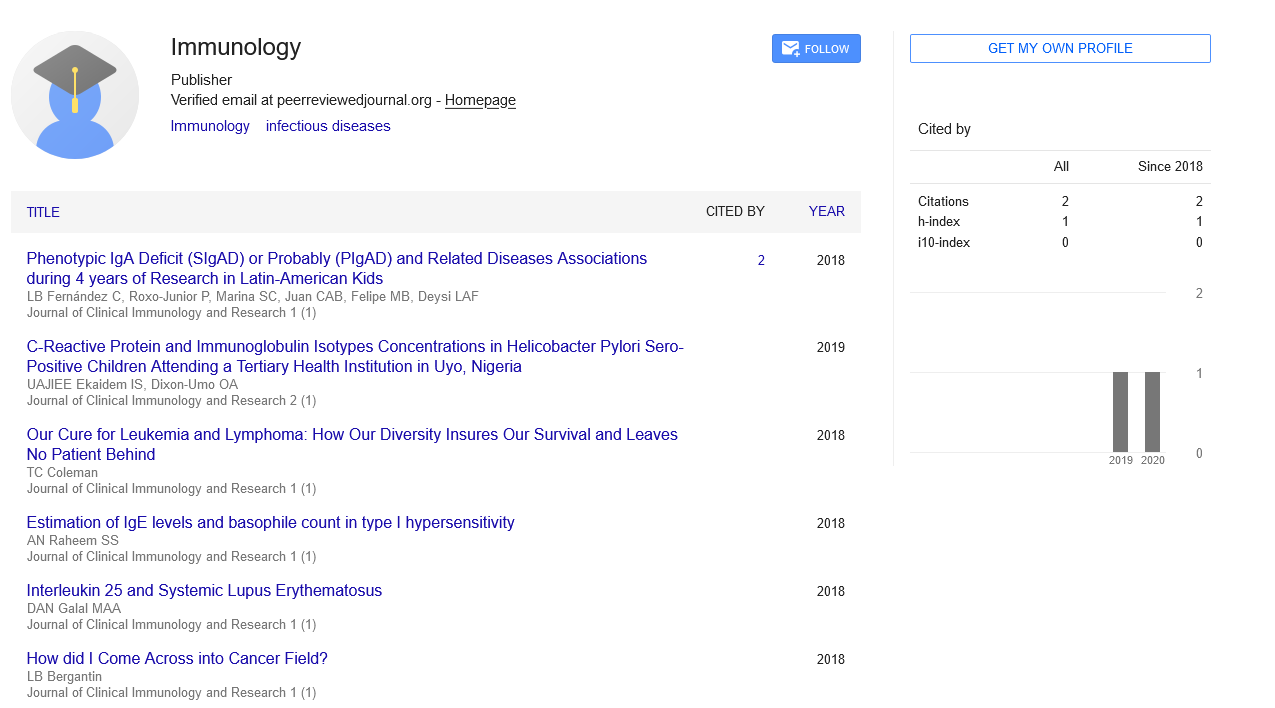Opinion Article, J Clin Immunol Res Vol: 6 Issue: 2
Clinical Mechanism of Immunosuppressants and its Therapeutic Applications
Michelle Hunt*
1Department of Thoracic Surgery, Heidelberg University, Heidelberg, Germany
*Corresponding Author: Michelle Hunt,
Department of Thoracic Surgery,
Heidelberg University, Heidelberg, Germany
E-mail: michellehunt@gmail.com
Received date: 15 May, 2023, Manuscript No. JCIR-23-104727;
Editor assigned date: 17 May, 2023, PreQC No JCIR-23-104727(PQ);
Reviewed date: 01 June, 2023, QC No JCIR-23-104727;
Revised date: 08 June, 2023, Manuscript No JCIR-23-104727 (R);
Published date: 16 June, 2023, DOI: 10.4172/JCIR.100083
Citation: Hunt M (2023) Clinical Mechanism of Immunosuppressants and its Therapeutic Applications. J Clin Immunol Res 6:2.
Description
The immune system is a powerful defense mechanism that protects our bodies from harmful pathogens and foreign substances. However, in certain medical conditions and therapeutic interventions, it becomes necessary to intentionally suppress the immune system. This process, known as immunosuppression, aims to dampen immune responses to prevent rejection of transplanted organs, manage autoimmune disorders, and treat certain types of cancer.
Mechanisms of immunosuppression
Immunosuppression can be achieved through various mechanisms that target different components of the immune system. These mechanisms include inhibition of immune cell activation, interference with immune cell communication, modulation of cytokine production, and induction of immune cell apoptosis. Drugs such as corticosteroids, calcineurin inhibitors, antimetabolites, and biologic agents are commonly used to achieve immunosuppression.
Therapeutic applications of immunosuppression
Immunosuppression plays a major role in various medical scenarios. It is essential in organ transplantation to prevent the recipient's immune system from attacking and rejecting the transplanted organ. Additionally, immunosuppressive therapies are used in the treatment of autoimmune diseases, such as rheumatoid arthritis and lupus, to control excessive immune responses that target the body's own tissues. Immunosuppression is also utilized in certain cancer treatments, such as hematopoietic stem cell transplantation and targeted immunotherapies.
Challenges and risks of immunosuppression
While immunosuppression can be beneficial, it also poses significant challenges and risks. One major concern is the increased susceptibility to infections. When the immune system is suppressed, it becomes more difficult for the body to defend against pathogens, leading to an increased risk of bacterial, viral, and fungal infections. Additionally, long-term immunosuppression can lead to the reactivation of latent infections, such as herpes viruses or tuberculosis.
Furthermore, immunosuppressive therapies may have adverse effects on other organs and systems in the body. These can include metabolic disturbances, bone loss, increased risk of certain types of cancer, and cardiovascular complications. Close monitoring and management of potential side effects are essential in individuals undergoing immunosuppressive treatments.
Individual variations and personalized approach
It is important to recognize that individuals may respond differently to immunosuppressive therapies. Factors such as age, genetics, underlying health conditions, and medication interactions can influence the effectiveness and tolerability of immunosuppression. Therefore, a personalized approach is important , with careful consideration of each patient's unique circumstances to optimize the balance between immune suppression and overall health.
Living with immunosuppression
For individuals with suppressed immune systems, extra precautions must be taken to minimize the risk of infections. This includes practicing good hygiene, avoiding contact with sick individuals, and adhering to vaccination schedules. Regular medical check-ups, close communication with healthcare providers, and proactive management of potential complications are essential for maintaining optimal health and well-being.
Conclusion
Immunosuppression is a complex and necessary medical intervention used to manage various conditions and treatments. While it poses challenges and risks, it plays a important role in organ transplantation, autoimmune disease management, and certain cancer treatments. A personalized approach, careful monitoring, and proactive management of potential complications are important to achieving the desired therapeutic outcomes while minimizing adverse effects. Ongoing research and advancements in immunosuppressive therapies aim to improve treatment efficacy and minimize long-term risks for individuals with suppressed immune systems.
 Spanish
Spanish  Chinese
Chinese  Russian
Russian  German
German  French
French  Japanese
Japanese  Portuguese
Portuguese  Hindi
Hindi 